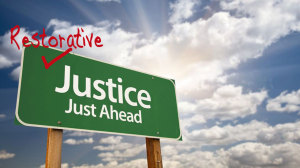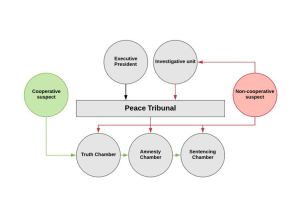nsnbc : Colombian President Juan Manuel Santos, on Monday, swore in 30 judges for the war crimes tribunal under the country’s special jurisdiction for peace and the restorative justice system that was agreed upon as part of the peace accord between the State and the FARC-EP even though it has been watered down much since the signing of the peace accord in December 2016.
 The Special Jurisdiction for Peace will seek restorative justice for Colombians who were victimized by the demobilized Revolutionary Armed Forces of Colombia and the military. The jurisdiction should initially also cover politicians and businessmen who are accused of war crimes and other most serious crimes. However, the current status quo is that accused politicians and businessmen can voluntarily submit to the transitional – restorative – justice court or to be subject to being charged within the normal justice system. The constitutional court ruled in 2017 that their cases will remain in the normal justice system.
The Special Jurisdiction for Peace will seek restorative justice for Colombians who were victimized by the demobilized Revolutionary Armed Forces of Colombia and the military. The jurisdiction should initially also cover politicians and businessmen who are accused of war crimes and other most serious crimes. However, the current status quo is that accused politicians and businessmen can voluntarily submit to the transitional – restorative – justice court or to be subject to being charged within the normal justice system. The constitutional court ruled in 2017 that their cases will remain in the normal justice system.
In total there will be 38 judges who will act across multiple chambers dealing with truth, justice and sentencing. The remaining eight judges will reportedly be performing other functions as well. It is expected that they will be sworn in at a later date with some waiting for a Constitutional Court ruling as to whether they are eligible.
Santos apparently ignored a ban on some of the judges imposed by Congress. When approving the transitional justice system, Congress controversially added a clause to ban anyone with experience in war crime cases. Some analysts noted that this demand may have be designed to close any “backdoor” for a possible attempt by the International Criminal Court (ICC) to influence the selection of judges.
Justice Minister Enrique Gil Botero, however, recently told the El Colombiano newspaper that the government considers the decision of Congress to be unconstitutional, claiming the clause is discriminatory.
 The highest instance of the Special Jurisdiction is the Peace tribunal, which is composed of the section of first instance in cases of recognition of responsibility, the section of first instance in cases of absence of recognition of responsibility, the appeal section, the review section and the stability and effectiveness section.
The highest instance of the Special Jurisdiction is the Peace tribunal, which is composed of the section of first instance in cases of recognition of responsibility, the section of first instance in cases of absence of recognition of responsibility, the appeal section, the review section and the stability and effectiveness section.
The Special Jurisdiction for Peace also includes the Chamber for the Recognition of Truth, Responsibility and the Determination of Acts and Conduct, the Amnesty Chamber or pardon and the Chamber for the Definition of Legal Situations. Ultimately, there will be 18 magistrates operating in the chambers and 20 in the court.
According to the April 2017 law that created the Special Jurisdiction, participants in the JEP will have to tell “the plain truth” of crimes they committed, “provide reparations to their victims, and guarantee they will never repeat their crimes” in order to avoid prison. Modeled in part over South Africa’s Truth and Reconciliation Commission, the system aims to “restore justice”, to prevent repetition, to compensate victims and to facilitate national reconciliation rather than a purely punitive system.
However, the justice system has the possibility to severely punish those who fail to comply. If the court finds that a participant fails to complete the requirements of truth, reparation and non-repetition, the court may dole out the maximum punishment of twenty years in prison. Meanwhile, if the court finds that a person continued committing crimes beyond December 2016, that person’s case will likely be referred to the criminal courts for ordinary sentencing.
Only those who have participated in the armed conflict in a direct manner such as military officials and soldiers, FARC members, police, and some civilians will be able to bring their cases to the JEP. If they fully cooperate with the system, perpetrators can expect to receive alternative sanctions, such as confinement to a community area where they will have to contribute as a volunteer for a number of years. They will also have to repair their victims in whatever way the court, and the victims, see as fit.
A/N & CH/L – nsnbc 16.01.2018
Source Article from https://nsnbc.me/2018/01/16/87516/
 RSS Feed
RSS Feed















 January 16th, 2018
January 16th, 2018  Awake Goy
Awake Goy 










 Posted in
Posted in  Tags:
Tags: 













